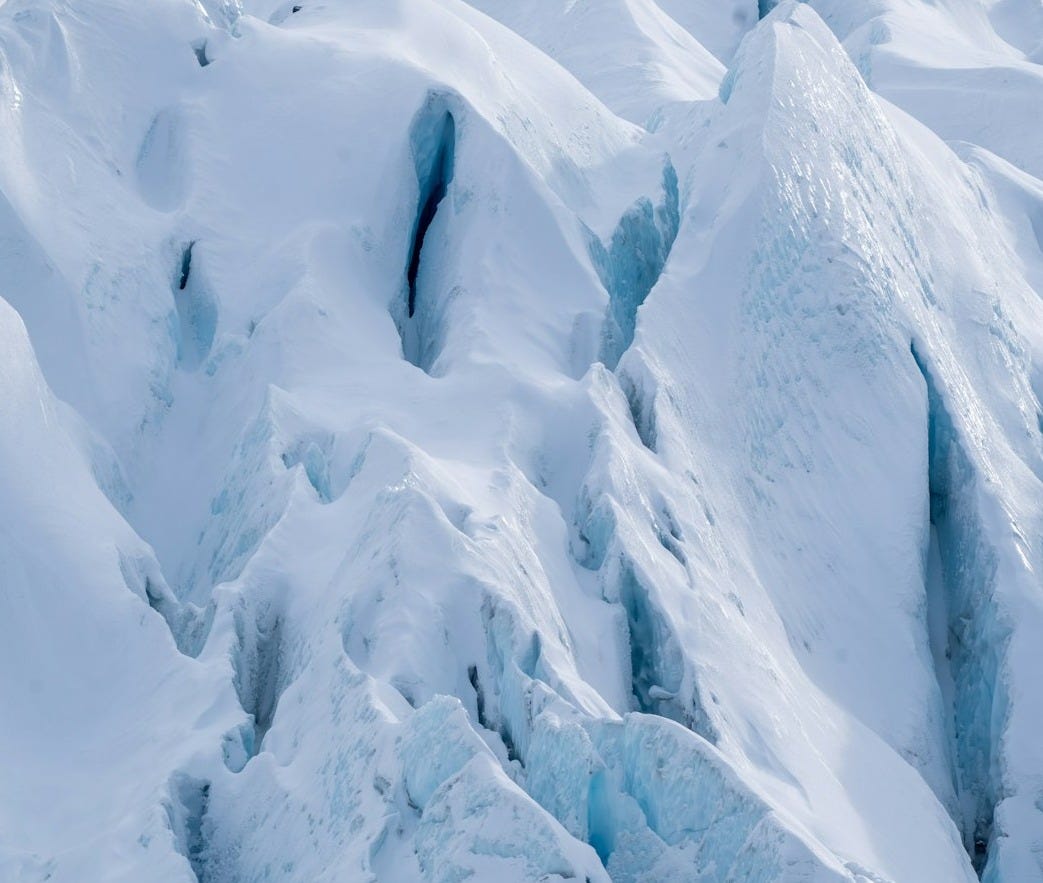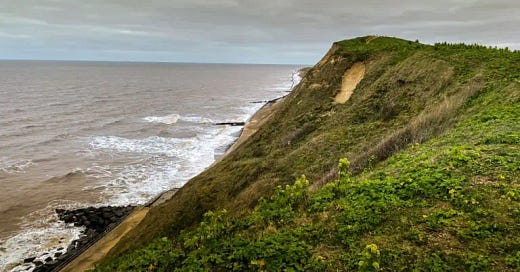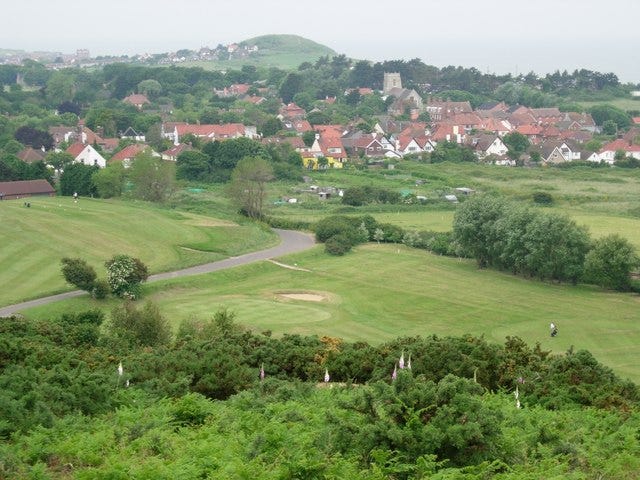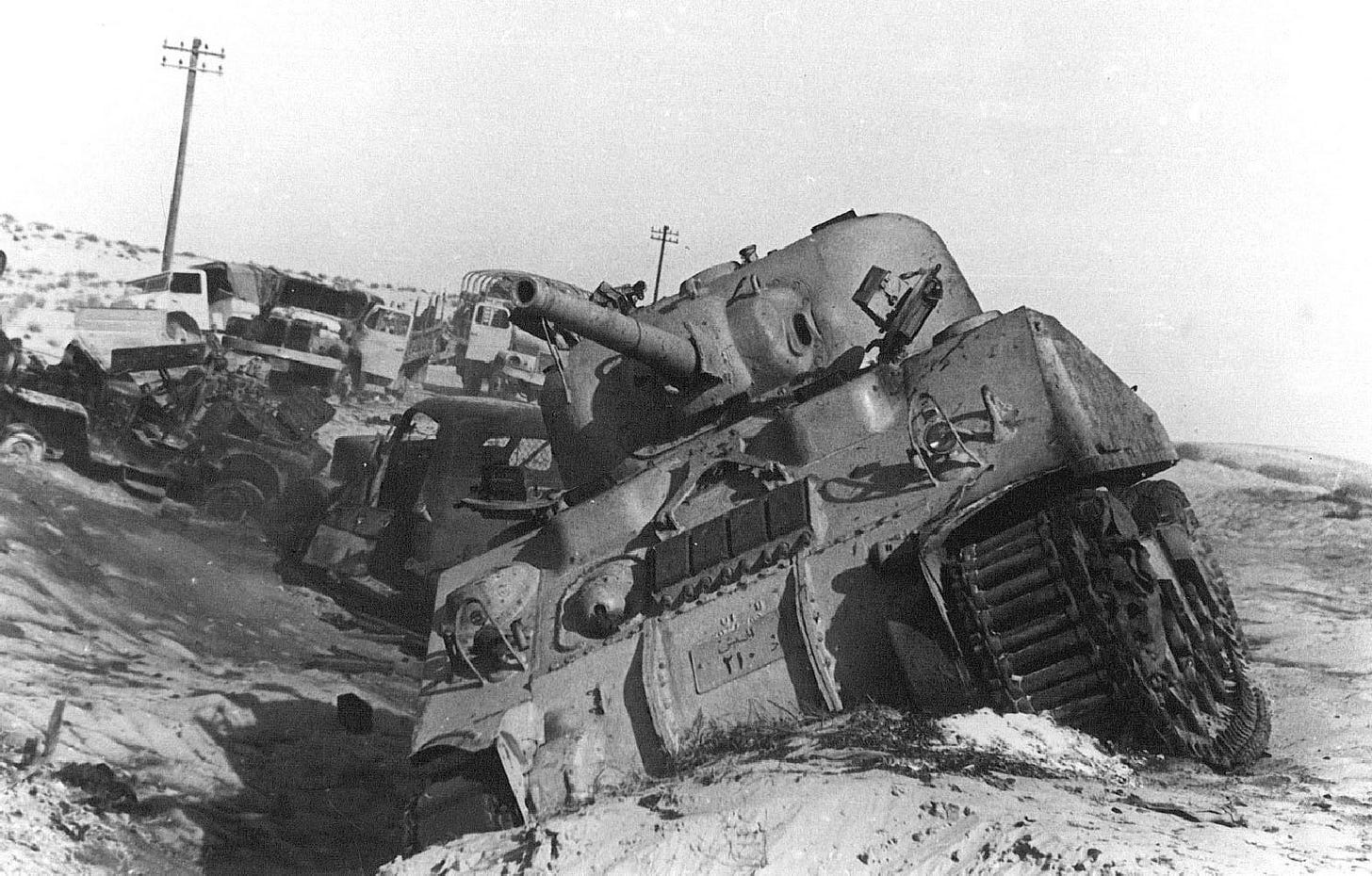Falling Into Beauty
Art invites us to know beauty and to solicit it, summon it, from even the most tragic of circumstances.” Toni Morrison
When I was nine years old my family moved to a quaint seaside village in northern England, into an old stucco-covered three-story house overlooking cliffs that dropped dramatically into the North Sea. Surrounded by a small rock wall, our house—named Lisdoonvarna—because all houses in the village had names instead of numbers—sat on the edge of an open field a few hundred yards away from a Medieval church.
Across the field a natural land formation known as the Beeston Bump, a huge mound formed during the ice age, rose out of the ground. It was used by the English coast guard during WWI as a viewing site where they intercepted radio signals from German E-boats. Nearby was a huge grass-filled hole left by a bomb dropped during the war. For my three younger siblings and me, the entire area was our playground.
On chilly mornings, we’d run through the church graveyard, through the mist, darting between headstones, singing, “Don’t step on the graves or the bones will pop up.” Then, we’d chase one another up the Bump and, back down again, stopping at the bottom, to catch our breath before running over to see the bomb hole.
When we grew tired, we’d head back to Lisdoonvarna, for a lunch of tomato soup and grilled cheese sandwiches. Then, while the two youngest ones napped, my younger brother and I wandered through the castle-like house, moving between rooms that opened onto one another in no predictable way. One of our favorite games was to chase one another up and down the wooden staircase that connected one floor to the other, our shoes echoing on the wooden steps as we ran. In the background, my mother yelled at us, warning that “you’ll fall and break something.” In spite of everything that could have harmed us, we loved living here, blissfully unaware that it was war that had brought us to this enchanted part of the world.
On dark nights, we’d gather in my parents’ second floor bedroom squeezing onto the window seat, where we’d take turns using my stepfather’s binoculars to find stars in the velvety black sky. I’d stare through the glasses hoping I’d see something move—a meteor or shooting star—until I became hypnotized by the immense empty blackness, punctuated by tiny twinkling stars. One evening, as I sat watching a star, I whispered under my breath. “Move. Please, move for me.” Suddenly, the light began to bounce up and down.
“Look,” I yelled. “The star is going to crash into us.” I saw another star next to it. It was bouncing up and down as well. A little unsure of what was happening, I put down the binoculars and when I looked up again, I could no longer see the line separating the sky from the sea below. I reached out to touch the window and looked above me to see if the ceiling was still in place. Had the sky collapsed, I wondered. Without making a sound? In one moment, the world had shifted, and I needed to right myself to see if the ground was moving beneath me. I turned to my mother who came to the window and sat down next to me.
“See,’ she said. “Those aren’t stars; they’re ships bouncing on the choppy waves.” She explained that I must have allowed the binoculars to slide down and that’s how the view had shifted. When I understood that the sky hadn’t really fallen, I was astonished by the magic of it all. I was mesmerized, bewitched by the way something so terrifying could turn into beauty. Looking back all these years, I’m sure the scene I’d witnessed must have begun to burn tiny pathways in my child’s brain, igniting my imagination in some new way.
That winter my stepfather, a military bomber pilot, was away doing something in the “cold war,” another concept I couldn’t quite grasp. Some evenings while he was gone, my mother would call us away from the window to join her on their oversized bed, where, laying in a row, we’d listen to the news crackle across the airwaves on the old radio she’d carried upstairs. The announcer mentioned something about Egypt and the King taking control of land. Weeks earlier, I’d heard my parents discussing air attacks over a faraway place they called the Suez Canal.
One evening, my mother switched off the radio and opened a book and began reading Robert Service poems to us. As I listened, my eyelids began to droop under the weight of the heavy lines, lyrics written by the Bard of the Yukon describing a hard life in the frozen land of Canada. There was a felt-sense of danger on the page, as he spoke of the land.
It’s the great, big, broad land ‘way up yonder,
It’s the forests where silence has lease;
How did silence look, I asked my mother. She ignored my question, continuing to read more of the description of the frozen land.
The snows that are older than history,
The woods where the weird shadows slant;
The stillness, the moonlight, the mystery,
As she read, I saw faint shadows on the walls of the bedroom. I didn’t know snow could be so powerful; it could last for years, bending trees. I wondered if it turned the sky white and I shivered a little bit, wondering if snowflakes fell without warning, like the stars that had seemed to fall out of the sky into the North Sea. The mystery, the not-knowingness must have added to the concept of dangerous beauty already forming in my mind. An idea not unlike war, which I could not find the words to explain.

For several weeks that year, my stepfather and his flight crew sat on alert on the flight line at the military base, awaiting orders as the Crisis unfolded in Egypt. The world sat with them, watching as peace and war approached the same invisible threshold, while Britain and France pushed Egyptian King Nasser to release control of the land he’d taken. The dispute had drawn in the attention of the Soviet Union, creating a tension that was beyond my ability to comprehend. War was only real to me in my stepfather’s absence and late-night mumblings between my parents about “refugees,” another word I didn’t understand, who might be transported to England.
Some mornings, I woke up to report having nightmares about bombs exploding near our house and was told to “Go back to sleep. It’s just your wild imagination.” My imagination didn’t feel much different from the reality we lived—-where stars crashed into the sea and people called refugees were “coming.” Could war also be silent like the snowfall in the Yukon, I wondered. Could it erupt without a sound? Could war be seen?
Looking back on this early experience, I can imagine the neurons firing in my young mind, coalescing around the ideas of uncertainty -maybe even fear—and danger. It was mixed up with a kind of beauty and a memory of play that filled my days.
As I grew into an adult, I found myself drawn into situations where destruction was waiting to occur but, rather than running away, I’d step in closer, enticed by the possibility of a sudden shifting of the horizon, knowing of my childhood delight with mystery. As a cold war child, I’d learned that one has to look carefully through the magnifying glass, slanting it a certain way to catch the grace of a falling object which is not immediately seen. I’d learned to expect moments of beauty in the midst of destruction.
These days, as I watch a world, I once knew as predictable fall into something unimaginable, I find myself watching for signs of beauty in the collapse. I’m waiting for traces of the unexpected to appear in the tragic circumstances we find ourselves living through. It’s an experience that is hard to define, but once you’ve had it, you’ll learn to stand in places where you can summon it to appear.






